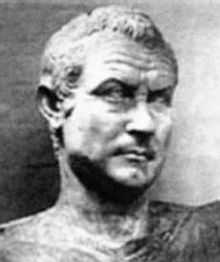Asinaria
| Asinaria | |
|---|---|
|
Plautus | |
| Written by | Plautus |
| Characters |
Demaenetus (an old man) Argyrippus (Demaenetus's son) Artemona (Demaenetus's wife) Philaenium (A prostitute) Leonida (a slave) Cleareta (a procuress) |
| Setting | Athenes, near the house of Demaenetus |
Asinaria (The One with the Asses) is a comic play by the Latin playwright Titus Maccius Plautus and is known as one of the great works of Roman comedy. It is famed for containing the phrase " Lupus est homo homini, non homo, quom qualis sit non novit." ("One man to another is a wolf, not a man, when he doesn't know what sort he is"[1])
Synopsis
The play takes place in Athens, near the homes of the old man Demaenetus and the procuress Cleareta. Demaenetus is submissive to his wife Artemona, but wishes to help his son Argyrippus gain money to free his lover, Cleareta's hetaera Philaenium. Demaenetus conspires with two of his slaves to cheat his wealthy wife of the money. The trick succeeds but a jealous lover reveals it to Artemona, who confronts her son and husband at a banquet held by Cleareta.
Translations
- Thomas Henry Riley, 1912.[2]
- Paul Nixon, 1916 [3]
- John Henderson, 2006 [4]
References
- ↑ Homo homini lupus AudioLatinProverbs.com, 06-03-07
- ↑ Thomas Henry Riley (1912). The Comedies of Plautus. G. Bell and Sons.
- ↑ Paul Nixon (1916). Plautus, I, Amphitryon. The Comedy of Asses. The Pot of Gold. The Two Bacchises. The Captives. Loeb Classical Library. ISBN 978-0-674-99067-8.
- ↑ Plauto; Translated by John Henderson (2006). Asinaria (The One with the Asses). University of Wisconsin Press. ISBN 0-299-21994-1.
External links
- Asinaria – Latin (full text) at The Latin Library.
- Asinaria – English translation on the Perseus Project. Translation by Thomas Henry Riley.
| ||||||||
